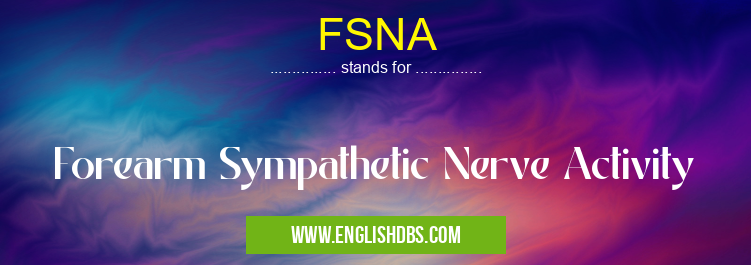What does FSNA mean in HEALTHCARE
FSNA stands for Forearm Sympathetic Nerve Activity. It is a measure of the activity of the sympathetic nervous system in the forearm. The sympathetic nervous system is responsible for the body's "fight or flight" response, and it plays a role in regulating blood pressure, heart rate, and other bodily functions.

FSNA meaning in Healthcare in Medical
FSNA mostly used in an acronym Healthcare in Category Medical that means Forearm Sympathetic Nerve Activity
Shorthand: FSNA,
Full Form: Forearm Sympathetic Nerve Activity
For more information of "Forearm Sympathetic Nerve Activity", see the section below.
» Medical » Healthcare
FSNA Measurement
FSNA is measured using a technique called microneurography. This technique involves inserting a small needle into a nerve in the forearm and recording the electrical activity of the nerve. The electrical activity is then analyzed to determine the level of sympathetic nerve activity.
Clinical Significance
FSNA is a useful tool for diagnosing and treating a variety of conditions, including:
- Hypertension (high blood pressure): FSNA can be used to determine if the sympathetic nervous system is overactive, which can contribute to high blood pressure.
- Heart failure: FSNA can be used to assess the severity of heart failure and to guide treatment.
- Raynaud's disease: FSNA can be used to diagnose Raynaud's disease, a condition that causes the fingers and toes to turn white and numb in response to cold temperatures.
Essential Questions and Answers on Forearm Sympathetic Nerve Activity in "MEDICAL»HEALTHCARE"
What is Forearm Sympathetic Nerve Activity (FSNA)?
Forearm Sympathetic Nerve Activity (FSNA) is a measure of the electrical activity in the sympathetic nerves of the forearm. These nerves are part of the autonomic nervous system, which controls involuntary bodily functions such as heart rate, blood pressure, and digestion. FSNA is commonly used as an indicator of sympathetic nervous system activity.
How is FSNA measured?
FSNA is typically measured using microneurography, a technique that involves inserting a fine wire electrode into a sympathetic nerve in the forearm. The electrical signals recorded from the nerve can then be analyzed to quantify FSNA.
What is the clinical significance of FSNA?
Measurements of FSNA can provide insights into the regulation of sympathetic nervous system activity and its role in various physiological and pathological conditions. For example, elevated FSNA has been associated with hypertension, diabetes, and obesity.
How is FSNA used in research?
FSNA is often used in research studies to investigate the effects of various interventions, such as exercise, meditation, or pharmacological therapies, on sympathetic nervous system activity. It can also be used to study the neural mechanisms underlying sympathetic responses to stress or other stimuli.
What are the limitations of FSNA measurement?
While FSNA provides valuable information about sympathetic nervous system activity, it is important to note that it is a measure of activity in a specific nerve and may not fully represent the activity of the entire sympathetic nervous system. Additionally, microneurography can be an invasive procedure and may not be suitable for all individuals.
Final Words: FSNA is a valuable tool for diagnosing and treating a variety of conditions. It is a safe and relatively non-invasive procedure that can provide important information about the activity of the sympathetic nervous system.
